Abstract
National security is not only a sum of mechanical actions and numbers of diplomas. It might be studied more closely to mark out problems in educational sphere and its connection to national security. Considering that, the article analyzes graduates and specialists’ professional incompetence as a potential threat to society and national security. Sociological research is carried out among workers and teachers of educational institutions, Department of education and students of Belgorod state technological university named after V.G. Shukhov and Institute of Medicine of Belgorod national research university. Results allowed identifying peculiarities of respondents’ understanding of competence and incompetence and their connection to national security. The paper deals with some parts of a model of professional qualification, pointed out by many Russian scientists. The overview of Russian and foreign literature on this issue is included. Furthermore, the article contains visual support of difference in opinions of respondent groups. The article is dedicated to description of research results of students and specialists’ interest in professional incompetence in Russia, concerns relevant problems - quality of general and personal training influence on national security provision. Survey results to find out respondents’ definition and opinion about national security, professional skills and education are described. In the author’s opinion, statistics of society’s attitude towards the issue can help to prevent mistakes in educational reforms, in producing national security strategy. The reference consists of latest decade literature of Russian and most competent foreign scientists in sociology of management and psychology.
Keywords: Professional competenceprofessional incompetencenational securityhighly skilled workershigher educationprofessional skills
Introduction
National security depends on many factors particularly on the degree of people’s education and educational politics, which the government carries out. Requirements for students are described in Federal state educational standards and proper training programs for staff. The requirements for graduates are defined more exactly by the Ministry of education and science of the Russian Federation in 2014–2015. The cultural and professional competences were added to the functioning list of demands for results of graduates’ skills. An educational process in the university is guided by the development of the students’ complex of demanded competence.
The correlation of education and national security is realized at the intersection of 2 points: on the one hand, the influence of an educational resource on the security provision and the provision of educational security, on the other, which are both factors and matters of national security.
The professional education system developed in USSR still is in permanent reformation. In these circumstances, the system of professionals’ training can damage to higher education quantity instead of helping a country to become the one that have highly-skilled workers. This in turn may have a negative impact on many spheres of professional activity. Anyway the mentioned above may have a negative effect on national security. In this regard, the necessity of the development of the state educational strategy and the effective system for training highly-skilled professionals actualizes.
The important role of workers’ professional skills and professionalism in the system of national security provision make for a choice of the applied research them
Problem Statement
The purpose of this study is to investigate the understanding impact of the students and workers of educational institutions that the incompetence can influence not only successful society’s functioning and development but also the national security provision.
Research Questions
The main questions for us to answer in this study are topical issues, which are concerned by political, educational, industrial, society’s development.
How do the people understand and define the “giants” of modern life – national security, education, professional skills and competence?
Do they see the direct connection between these issues?
Do the enterprises or educational institutes try to decide or just take into account these problems in their activity?
Is it necessary to work additionally with introduced groups of society to make discussed problems more clear for them and to avoid regression in professional activity of some spheres?
Purpose of the Study
The purpose of sociological research is to find out the students’ and teachers’ attitudes towards the problem of professional competence and national security interaction. The wrong understanding of these notions can lead to the problems of the workers’ future promotion, quality of their activity and also to the effectiveness of the company’s production process itself.
Research Methods
The sociological research was conducted in three organizations the two of which were presented by the students and teachers as respondents. The method of the research was an opinion poll. The total number of the potential respondents is 3 247. The size of the sample is 114 respondents which consists of students, workers of educational institutions and that is 3.5 % of the total number. The teachers of the Department of Engineering and Building of Belgorod State Technological University named after V.G. Shukhov (BSTU named after V.G. Shukhov), workers of the Department of education of one the districts of Belgorod area and students of Institute of Medicine of Belgorod National Research University (BSNRU). The “workers” category respondents include the specialists of the different age brackets who graduated 5–10 years ago and got the qualification of specialist or even academic degree.
The survey consists of the test questions and the ones that demand detailed answer. The usage of this kind of survey allows finding out the opinions of people who work in educational sphere.
The definite surveys were produced for certain respondent groups. Some questions in teachers’ and students’ surveys were the exactly same and were dedicated to the problems of professional competence and national security. Part of the questions suggested to the respondents to define the mentioned above issues. The respondents were offered to compare their own level of professional competence to their colleagues’ ones – what was meant for the teachers and to suppose the graduate’s professional skills – for the students group. Additionally, the participants were asked give their own description of the described issues.
Citizens who are not related to science, educational activities or human resources in their professional activity usually have a little distorted understanding about professional competence concerning the components of the Sociologists and Pedagogues emphasize (Shcherbacova, 2018). Also quality of higher education are very common issues in modern society or as it’s widely spread to name – the training. There is one conceptual difference between these concepts: “training gives one skills; education leads one toward a purpose” (Grygiel, 2013).
The matter of national security is topical in every country what changes the prerequisites and circumstances under which the different systems of its provision are elaborated (Elfimova, 2012; Lasovskaya, 2011). There are many definitions of national security in Russian and foreign literature. We emphasized several points that were included in surveys and are considered by many scientists. The aspects which are forming national security in every country depend on national interests (Russia's national security strategy to 2020б 2014; Official Internet resource of the president of Russia, 2015). The definition of national security that is given in the President edict “The Russian Federation's National Security Strategy” was used as basis of the research. In the document, the term “national security” is considered as “the state of protection of the individual, society, and the state against internal and external threats in the process of which the exercise of the constitutional rights and freedoms of citizens of the Russian Federation (hereinafter citizens), a decent quality of life and standard of living for them, sovereignty, independence, state and territorial integrity, and sustainable socioeconomic development of the Russian Federation are ensure” (Saidov & Kashinskaya, 2005). Respondents were asked to give their own definition of term “national security”.
The documents such as job descriptions contain not only list of the main responsibilities that employee is supposed to do but also the number of professional skills the workers must have. Today the companies have consistently increased the requirements towards their workers no matter how much experienced they are. In this regard the Ministry of education with the help of pedologists and scientists work out and perfect methods to teach students and workers (Tejedor, Segalas, & Rosas-Casals, 2018; Tvenge, Martinsen & Sri Sudha Vijay Keshav Kolla, 2016; Tvenge & Ogorodnyk, 2018).
The results can be divided into three groups under the conditions of the absence of multiple choices. Part of these groups is also considered in the low documents and scientific literature.
Protection against internal and external threats.
The issue that studies security.
Work of every society’s member.
The respondents of the students’ category were asked to express their opinion about meaning of national security. The results showed that some respondents have full understanding of the issues and that proves partial awareness of people about the discussed matter (Figure

The results showed that young people understand national security as the main part of protection from the internal and external threats (36% – Institute of Engineering and Building; 60% – Institute of Medicine). This statistic can be explained by the type of information which is available for the students. There are several sources from which the students get information; these are newspapers, magazines or TV. But usually the main source is a social network. Mass media, what is not a big secret, in some degree (material, political etc.) have a stake in news they broadcast. Lately it has widely spread an outright politization of some media outlets (Mescheryakov, 2016). In this regard, it is not appropriate to trust only one source what cannot be taken as an objective perception. So, there is a security education especially developed for students to become more confident and skilled (Caballero, 2017). Taking into account the information warfare what have been taking place at least for last decade it is necessary to analyze the received data especially these skills should be developed in young people because sometimes they are too trustful.
The respondents of the workers’ category (Fig.

The students were also asked to express their point of view about the situation when the graduate becomes a professional under the conditions of necessary practice experience absence during the study in university (Figure
In view of the results (Figure
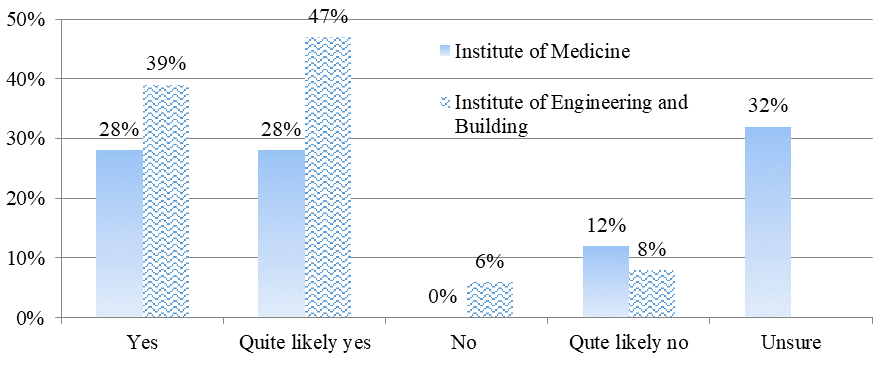
It should be noticed that a lot of attention is paid to an education in different law documents such as Russian national security strategy etc. that stimulates popularity of its faster growth among people. Every evidence of that is generous financing and any other necessary support in educational reforming, innovations. The students have different points of view about the national security dependence on professional competence (Figure
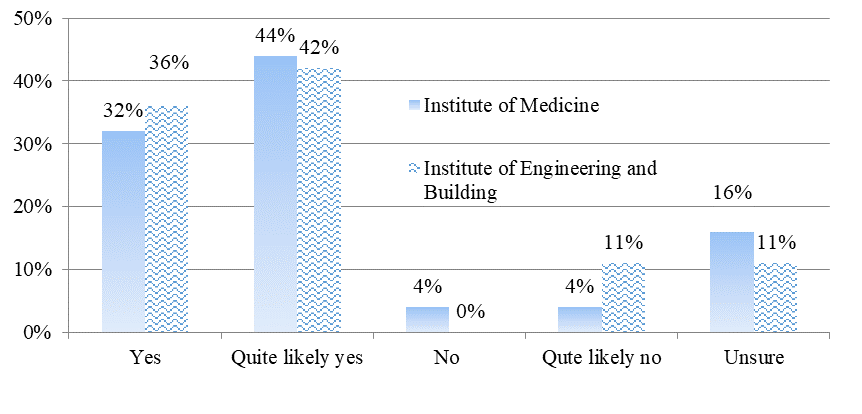
After the detailed analysis of the results, we can conclude that the majority of students think that professional competence is the factor that has an influence on national security. The positive fact should be noted that the students instinctively or consciously evaluate the role of qualitative work and qualified staff for country.
In conditions of widely used published data’s fabrication and variation there is an acute need in skills of young people to analyze the received information. The study in university instills the sense of responsibility, high level of occupational knowledge and general culture, the ability to perceive, analyze and summarize any information in young generation; also it plays a big role for the students’ socialization (Farahani, 2014). Sometimes the importance of educational process is wrongly minimized what can have strong consequences (Ivanova, 2014). Particularly these skills are necessary in view of the modern information flow. Due to the peculiarities described above, there are two benefits, on the one hand, the future professionals have a great influence on all activity spheres and undoubtedly the country needs highly-skilled professionals on the other. The national security provision in conditions of informational analysis is formed with the help of the importance and scope of modern work of professionals, their consciousness and organization.
to identify the spheres of national security what needs law mediation;
to name the problem in a particular sphere of activity (Verbitskaya, 2015).
The information awareness, teachers, scientists of universities and organizations’ work with students influenced on their high evaluation of the professional competence dependence on national security and actions of the employees.
There is being a tendency to hire employees who are able to do their direct functions and additional ones if it’s necessary at least for the last decade. Taking into consideration the described fact above it becomes clear that national security depends on the actions of the whole staff of the country. The majority of the respondents of “workers” category has a big experience so they can be considered as high skilled.
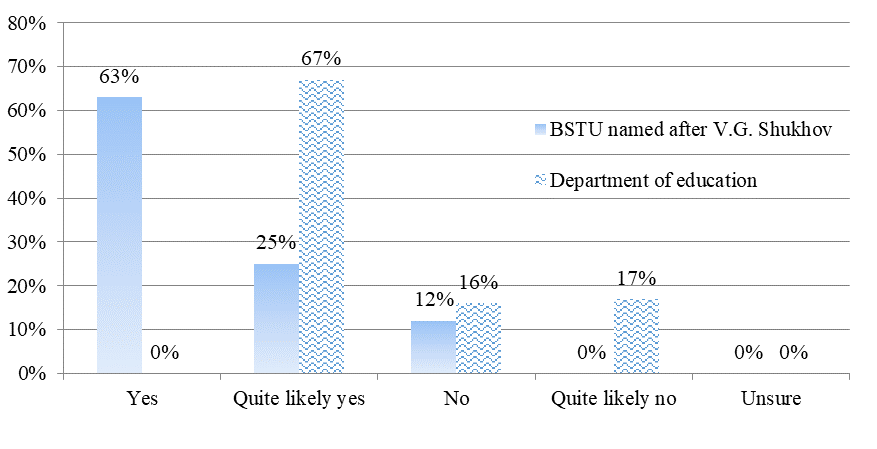
The work of the university teachers and employees of the Department of education is based mainly on receiving the information, its interpretation, data handling and its passing to students and pupils or so-called the recycling. These exact skills help the employees to gain an understanding of some questions what defines national security dependence on professional skills of every member of the staff (Figure
The research results of the opinions of university teachers, workers and students about the issue of national security provision are divided (Figure
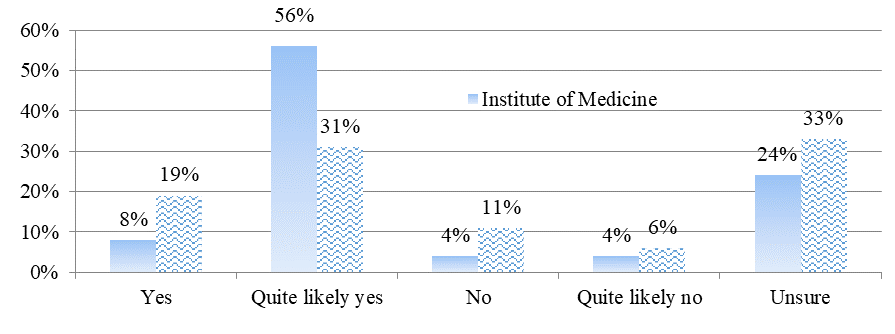
The results of the survey showed the difference of attitudes of respondents and their evaluation of the enterprises’ activities (Figure
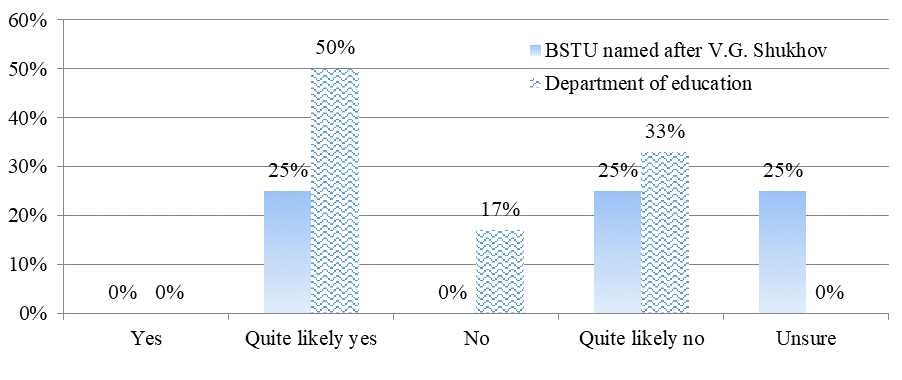
Comparing the results of the surveys of the students (Figure
Findings
Taking into account the results obtained during the opinion poll it seems possible to name the most frequent peculiarities what can lead to some problems in education, business and national security.
Firstly, the students understand the national security in general and sometimes these view are wrong or too general that the true meaning is lost. The peculiarities of workers’ answers are the same.
Secondly, all groups of respondents agree that the professional competence influence on provision of national security.
Thirdly, we found out that the workers do not see the enterprises’ activity focusing on provision of national security or at least to try to collaborate with the authorized government agencies.
The staff of educational institution is supposed to graduate the courses aimed on improvement of qualification, and to undertake the reskilling due to what they are aware of the tendencies in education, national security and professional competence interaction. Therefore, we found out that respondents can define the scope of the term “national security” and determine the professional skills influence on the provision of national security. Fortunately, this fact rejects the hypothesis envisioned at the beginning of the research. Consequently, there is a potential problem that has to be taken into consideration by educational institutions and different enterprises of the Russian Federation – to work more closely with young people to achieve their full understanding of the issue of this research.
Conclusion
The overall results of sociological research allow setting up a number of statements. The opinions of respondents about the discussed issues are divided, but they mainly suppose that higher education is able to supply the newly graduate specialists with all necessary professional skills for their future successful career.
The respondents’ views mostly contained two components the educational process must be oriented to: the knowledge and skills but they are only the parts of the process. The other two components of professional competence and general culture either was not taken into account at all or just had insignificant priority among the teachers and the students. Accordingly, the wrong priorities can orient towards the erroneous direction of the professional activity or generally influence on its quality. The future professionals have the same problem. The priorities set in the process of forming professional skills will influence on the labor activity in future.
Summarizing the research, we should point out that it showed the necessity of work with the students and experienced employees concerning both: national security and all kinds of the professional competence, based on the knowledge, skills and personal qualities what begins with quality of the newly graduated of the worker’s own and enterprise’s activity.
References
- Caballero, A. (2017). Chapter 33 – Security Education, Training, and Awareness Computer and Information Security Handbook (Third Edition). Morgan Kaufman publishers.
- Elfimova, O.S. (2012). The concept of security in western modern times sociological theories. Vestnik of Lobachevsky State University of Nizhni Novgorod. Series: Social Sciences, 3, 24, 35-41.
- Farahani, M, F. (2014). The Role of Global Citizenship Education in World Peace and Security. Procedia - Social and Behavioral Sciences, 116, 21. Pp 934–938.
- Grygiel, J. (2013). Educating for National Security. Orbis, 57, 2, 201-216.
- Ivanova, S.V. (2014). Educational space in scientific research and legal documents: notions, practice, complicacy and risks. Values and meanings, 5, 33, 4-17.
- Lasovskaya, N.F. (2011). The main constituents of national security of modern Russia. Historical and social-educational idea, 4, 9, 119-123.
- Mescheryakov, I.V. (2016). The function of the media in state information policy for the national security. Siberian Journal of Economics and Management, 6, 29, 70-82.
- Official Internet resource of the president of Russia. Russian national security strategy, December 2015. 31 December 2015 г. Moscow. the Kremlin. 2015. Retrieved from http://kremlin.ru/.
- Russia's national security strategy to 2020: dated 12.05.2009 № 537 (edited 01.07.2014). Moscow. ConsultantPlus, 1992–2014. Retrieved from http://www.consultant.ru/document/cons_doc_LAW_87685/.
- Saidov, A.H., Kashinskaya L.F. (2005). National security and national interests: correlation and inteaction (experience of political and law analysis). Journal of Russian Law, 12, 108, 119-126
- Shcherbacova, A.I. (2018). Professional competence in workers’, instructors’ and students’ understanding. Vector of science of Togliatti state university, 1, 43, 137-144.
- Tejedor, G., Segalas, J., Rosas-Casals, M. (2018). Transdisciplinarity in higher education for sustainability: How discourses are approached in engineering education. Journal of Cleaner Production, 175, 29-37.
- Tvenge, N., Martinsen, K., Sri Sudha Vijay Keshav Kolla (2016). Combining learning factories and ICT- based situated learning. Procedia CIRP, 54, 101-106.
- Tvenge, N., Ogorodnyk, O. (2018). Deveopment of evaluation tools for learning factories in manufacturing education. 8th Conference on Learning Factories - Advanced Engineering Education & Training for Manufacturing Innovation, 23, 33-38.
- Verbitskaya, T.V. (2015). Concerning participation of society in national security and defense. Theory and practice of social development),1, 66-68.
Copyright information

This work is licensed under a Creative Commons Attribution-NonCommercial-NoDerivatives 4.0 International License.
About this article
Publication Date
17 December 2018
Article Doi
eBook ISBN
978-1-80296-049-5
Publisher
Future Academy
Volume
50
Print ISBN (optional)
-
Edition Number
1st Edition
Pages
1-1464
Subjects
Social sciences, modern society,innovation, social science and technology, organizational behaviour, organizational theory
Cite this article as:
Grebenyuk, A., Danakin, N., & Altynnik, N. (2018). Significance Of Electronic Commerce In Development Of Rf Innovative Economy. In I. B. Ardashkin, B. Vladimir Iosifovich, & N. V. Martyushev (Eds.), Research Paradigms Transformation in Social Sciences, vol 50. European Proceedings of Social and Behavioural Sciences (pp. 467-476). Future Academy. https://doi.org/10.15405/epsbs.2018.12.56

